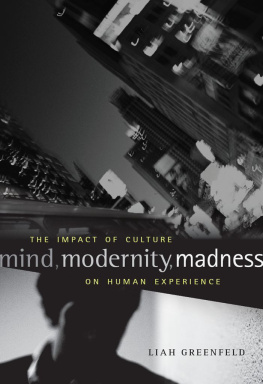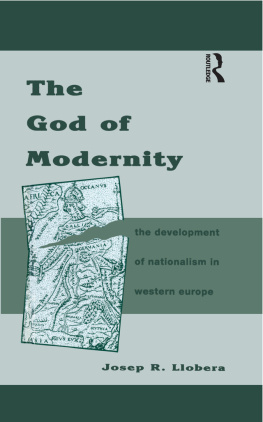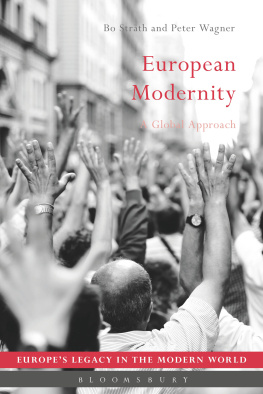MIND, MODERNITY, MADNESS
MIND, MODERNITY, MADNESS
The Impact of Culture on Human Experience
LIAH GREENFELD
HARVARD UNIVERSITY PRESS
Cambridge, Massachusetts, and London, England
2013
Copyright 2013 by the President and Fellows of Harvard College
All rights reserved
Jacket photographs: top, PhotoAlto; bottom, Thinkstock.
Library of Congress Cataloging-in-Publication Data
Greenfeld, Liah.
Mind, modernity, madness : the impact of culture on human experience / Liah Greenfeld.
p. cm.
Includes bibliographical references and index.
ISBN 978-0-674-07276-3
1. Mental illnessSocial aspectsHistory. 2. Cultural psychiatryHistory. 3. NationalismPsychological aspects. I. Title.
RC455.G726 2013
616.89dc23 2012035113
To Gil and Natan Press
and to Dr. Victoria Kirshenblatt
Contents
This book is dedicated to my son, my mother, and my husband.
My son accompanied me on the exploration of medical librariesspending hours at the copying machine in the freezing lower floor of Boston Countway Library while I read, and making sure I didnt expire in the heat of Bethesda in August as I walked between the National Library of Medicine and the motel in which we bivouacked for the purpose of researching the rarest gems of literature on madness. He also served as my guide to the confused world of American young adulthood, ravaged by this modern disease. In many ways he inspired this project and helped me think through it. In particular, he helped me to arrive at the definition of love.
My mother, a person of most powerful intelligence and iron will, a questioner and a doubter, has been a lifelong example for me of truly independent mind. She dreamt of becoming a physicist, but was forced by the circumstances to become a physician, wanted to be a psychiatrist, but was forced by the circumstances to spend the first two decades of her medical career as a tuberculosis specialist and the last three as a pediatrician. She shared with me her exceptionally broad knowledge of medicine and of Russian and world literature, specifically attracting my attention to the depictions of mental disease. Working on this book, I felt that I was in some way going in the direction in which she might have wished to go, were her circumstances different, and it has been of tremendous importance for me to finish this work while she is still here to know that.
Without my husband this book could not be written simply because I would not be, which says it all.
In the twenty years that passed between the publication of the first book in this trilogy and the third, this, one, I have been fortunate to meet and acquire the friendship of colleagues and studentsincreasingly students who became colleaguesfrom many countries and a wide range of disciplines. Together, they now form a vibrant intellectual community (a sort of invisible college), truly sustaining for me. In the time that it took this book to gestate, they patiently listened to my first attempts to formulate its argument, read drafts of chapters, asked probing questions, offered critical comments. They include, in alphabetical order, Mike Aronson (my caring Harvard University Press editor), Peter Baehr, Darius Barron, Oliver Benoit, Harold Bursztajn, Katrina Demulling, Francesco Duina, Jonathan Eastwood, Edward Gormbley, George Liber, Charles Lindholm, Eric Malczewski, Dmitri Panchenko, David Phillippi, Nikolas Prevelakis, Nathalie Richard, Chandler Rosenberger, Mark Simes, James Stergios, John Stone, and Chikako Takeishi. I thank them all. I am in particular obliged to Nikolas Prevelakis for the help with the annotation of the first chapter, and to David Phillippi, who read the entire book several times and started a blog to popularize its ideas, and Mark Simes, my official and most excellent assistant, who followed their development from day one, kept me abreast of every piece of news in neuroscience, and helped me to prepare the text for publication. I cannot stress enough how important the belief of all these people in my work has been for me.
The purpose of this book is to make evident that culture is an empirical reality of the first order in human lifethat it, in the most profound sense of the word makes us human and defines human experience. Its empirical focus, the area of experience chosen to drive this point home, is the phenomenon for a long time called simply madness, but today regarded either as three mental diseasesthe big three of contemporary psychiatry: schizophrenia, bipolar disorder, and major depressionor as the two varieties of psychotic disorder with unknown organic basis: schizophrenia and manic-depressive affective illness (which includes major depression). There are very good reasons for this choice. Schizophrenia and manic-depressive illness are the most severe mental diseases whose biological reality and life-threatening effects are undeniable. Schizophrenia is referred to as the cancer of the mind, and suicide in the Western world in the vast majority of cases is believed to result from depression. Proving that these biologically real diseases are culturally caused, that they are products of culturewhich is what the book argueswould demonstrate the impact of culture on human experience in the seemingly most unlikely case and make self-evident its influence in other spheres of life, such as economics and politics, for instance, in which, though largely disputed, it has been arguable.
Being, generally speaking, a book about the impact of culture on the human mind, it is, more specifically, one about the ways modern culture shapes the mind. Even more specifically, it is a book about the role of national consciousnesswhich forms the framework of modern culturein causing psychiatrys big three. Thus, though it stands on its own, it forms the concluding volume of the trilogy on nationalism, the first two volumes of which are Nationalism: Five Roads to Modernity and The Spirit of Capitalism: Nationalism and Economic Growth.
In addition to extending the discussion of the effects of nationalism from the public sphere, in which political and economic activities take place, into the most personal corners of existential experience, this concluding volume spells out the philosophical and theoretical principles underlying the argument of the entire trilogy and, in particular, explains what makes historical evidence empirical in precisely the sense in which evidence drawn upon in biology and physics is empirical, allowing one to place historical and sociological accounts of human affairs in the same epistemic category: i.e., within science. It explains, in other words, why historical phenomena, while being different in kind, lend themselves no less than biological and physical phenomena (which are also different in kind from each other) to empirical and logical analysis, which, like such analysis in other areas of study, can lead to the accumulation of objective knowledge.
The Argument and Its Provenance
The central argument of this book connects in a causal relationship the cultural phenomenon of nationalism and psychiatric diseases of unknown etiology: schizophrenia, manic depression, and major unipolar depression. These diseases are the explanans, the effect, and nationalism is the explanandum, the cause. Nationalism is understood in the terms developed in Nationalism: Five Roads to Modernity and applied in The Spirit of Capitalism. It is a form of consciousness, an essentially secular view of reality, whose socio-political component rests on the principles of fundamental equality of membership in a community and popular sovereignty. As I hope I have demonstrated in
Next page









